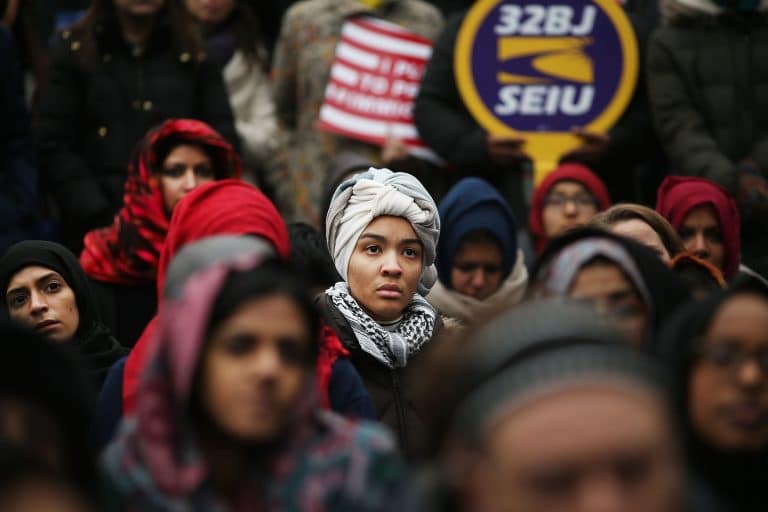
Image by Spencer Platt/Getty Images, © All Rights Reserved.
Is the American Promise Jeopardized by the Muslim Ban?
I am a teacher. Teaching is what I do. It’s tied to my core belief that knowledge is more powerful than ignorance, that light is more beautiful than darkness, and love more divine than hatred. This is why I teach, because I do believe in education, in truth, in facts, and in uplifting knowledge and wisdom.
I am also a citizen. My teaching is tied to my commitment to building a beloved community, and being a public citizen of an America that we have to create together, an America that we have yet to build. I am hopeful, even in these days and nights of exhaustion and fatigue of the soul, that we can build such an inclusive and just America.
In light of those commitments to the public good and teaching, I wanted to share some observations about President Trump’s Muslim ban. This affects me personally, deeply, and I will write more about it in the coming weeks. It hurts me, it hurts my family, it hurts my friends, it hurts my community, it hurts my students, and — though it might be least obvious — it hurts my America. More on that soon.
The latest polls indicate that we are deeply divided about Trump’s ban on Muslims. Forty-eight percent of Americans overall agree with the ban, 41 percent disagree with the ban, and about ten percent say that they do not have enough information to agree or disagree. As a member of a community that is already deeply hurt by this ban, I wanted to reach out both to those who are undecided and to those who have so far agreed with it. I say it not out of partisan interest, but because I am fundamentally persuaded that this hurts vulnerable people and it hurts our republic.
By now we have seen the airport protests. The protests around the world. Muslims and Jews standing shoulder-to-shoulder against this ban against seven Muslim-majority countries (Iran, Iraq, Syria, Yemen, Somalia, Sudan, and Libya). We have seen the acting attorney general, Sally Yates, declaring the ban unconstitutional, and Trump immediately firing her. Trump’s White House chief of staff has also indicated that the list of Muslim-majority countries might be expanded to include countries like Pakistan.
One question still remains: Is this ban a Muslim ban?
Let us remember Trump’s own words, promising in December 2015 that there would be “a total and complete shutdown of Muslims entering the United States.” Yes, he promised us a Muslim ban, and he has delivered us a Muslim ban — under whatever disguise.
Trump himself had talked about a Muslim ban, and a plan to not roll it back, but to expand it:
“People were so upset when I used the word ‘Muslim.’ Oh, you can’t use the word ‘Muslim.’ Remember this. And I’m okay with that, because I’m talking territory instead of Muslim.”
The intent again is evidently clear. The thinly disguised Muslim ban is also apparent from a conversation he had with former New York City mayor Rudy Giuliani. Giuliani told Fox News reporter Jeanine Pirro:
“I’ll tell you the whole history of it… So when he [Trump] first announced it, he said, ‘Muslim ban.’ He called me up. He said, ‘Put a commission together. Show me the right way to do it legally.’
I put a commission together of Judge Michael Mukasey, Congressman Mike McCaul (Republican, Texas) and Peter T. King (Republican, N.Y.), whole group of other very expert lawyers on this. What we did was, we focused on, instead of religion, danger — the areas of the world that create danger for us. Which is a factual basis, not a religious basis. Perfectly legal, perfectly sensible. And that’s what the ban is based on. It’s not based on religion. It’s based on places where there are substantial evidence that people are sending terrorists into our country.”
Let us recognize this quickly. Trump asked for a Muslim ban. And he called up Giuliani for a way of framing it legally. And Giuliani got people — including Peter King, who had called for the witch-hunt Islamophobic congressional hearings — to help him figure out how to disguise it as a geographic orientation.
And if we needed any further evidence, here is the blatant notion that 134 million people are treated under the rubric of “substantial evidence that people are sending terrorists into our country.” Even the very title of Trump’s executive order is “Protecting the Nation from Foreign Terrorist Entry into the United States.” In other words, more than a hundred million people are being treated under the rubric of “foreign terrorists,” including turning people away who have valid visas for entering the United States.
Many of us have heard that in the last 40 years, there have been zero terrorist fatalities on U.S. soil from Iranians, zero from Iraqis, zero from Somalia, zero from Yemen, zero from Sudan, zero from Libya. You get the picture. This has nothing to do with keeping America safe. This is about legally and institutionally enshrining discrimination against people on the basis of their religion and national origin.
Let’s see the racial basis of this. Just a few days ago, a white, racist, nationalist Canadian named Alexandre Bissonnette opened fire at a Quebec mosque, killing six worshippers. The prime minster of Canada declared it a terrorist attack.
What do we know about this terrorist? On his Facebook page, he declared his hatred of immigrants, his love of Trump, his support for the Israel Defense Force (IDF), support for the French racist Marine Le Pen, the atheist crusader Richard Dawkins, and was particularly full of hatred towards feminists, whom he called “femi-nazis.”
How do we keep America safe? Do we ban Canadians? White people? Trump supporters? IDF supporters? Misogynists? And why not? Why do we ban 134 million people who have not caused any terrorist actions, while refusing to take similar actions against the Alexandre Bissonnettes of the world, the Dylann Roofs of the world? That discrepancy is rooted in white privilege, xenophobia, and Islamophobia. When we ban more than a hundred million people from Muslim-majority countries, and rush to call Dylann Roof and Alexandre Bissonnette “lone wolves” without interrogating the system and structure of racism and hatred that produced their violence, that is white privilege.
To state the obvious, no one is asking for us to discriminate against white folks, or Christians, or certainly Canadians. No, we are talking about actually holding people responsible and accountable for the actions that they themselves commit, and not discriminating against people on the basis of their religion and national origin.
As if we needed more evidence of this being a Muslim ban, there is Trump’s own interview about the ban. Trump himself openly admitted to Christian Broadcast Network that he would favor giving priority to Christian refugees from the same banned countries. This echoes the language in the executive order itself that singles out favoring religious minorities from these heavily Muslim-majority countries. In other words, the ban on these Muslim-majority countries is not targeted against the Christians or Jews, but against Muslims. Exactly as Trump himself said he would do again and again during the campaign.
“They’ve been horribly treated… Do you know if you were a Christian in Syria it was impossible, at least very tough, to get into the United States? If you were a Muslim you could come in, but if you were a Christian it was almost impossible.”
So what has this Muslim ban resulted in?
There are thousands of students and scholars in the United States who have been granted visas, and unable to resume their studies. There are families torn apart. There are even reports of five year old children being handcuffed in airports. These are American citizens, but that shouldn’t matter. Children of any country being handcuffed is an abomination. And the White House press secretary, Sean Spicer, had the audacity to defend this by talking about children as a threat to national security. Yes, this is where we are.
This is a Muslim ban. It is an unjust, illegal, immoral, unconstitutional Muslim ban. Yes, it is unjust for Muslims, unjust for refugees, and it makes a mockery of who and what we wish to be as a multi-faith, multi-ethnic, multi-religious community of Americans.
If we want to insist that these actions are un-American, then we have to create an America in which these actions, even if enforced by the executive order of the sitting president, become confronted with the soul force of We the People. Then and only then would this Muslim ban be truly un-American.
Let me come back around to what I started with. I oppose this ban because it is prejudicial against 134 million human beings; because it paints millions of people with a broad brush not on the basis of anything they have done but on the basis of their religion and national origin; because it won’t keep us safer; but most of all because it impoverishes the promise of the highest ideals of what America stands for. It is out of a deep sense of love and a deep sense of disappointment that I am reaching out to my fellow citizens. Let us be better, let us be kinder, and let us be more just.

